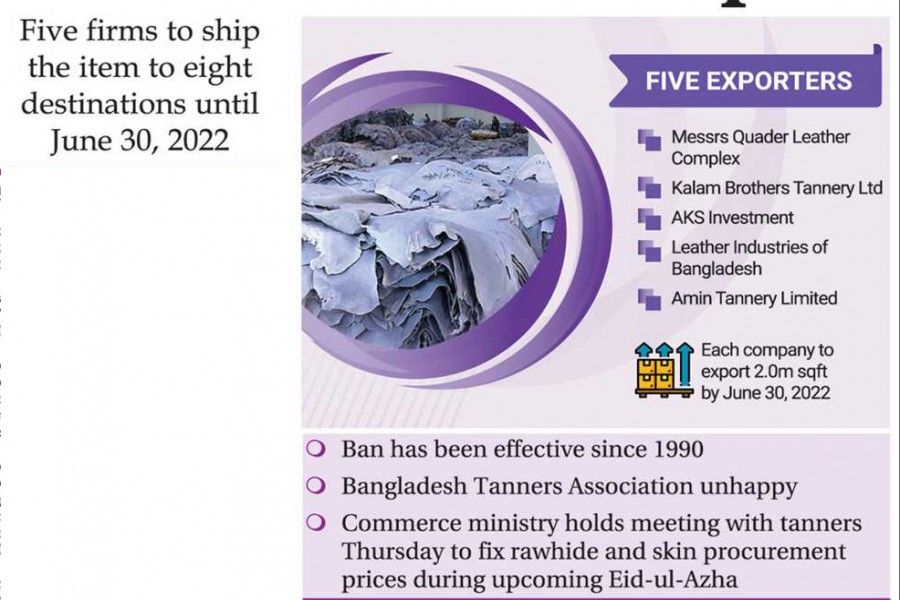The government has decided to lift restrictions on the export of wet blue leather for the first time in 21 years to help ensure fair price of the item in the domestic market.
The export, however, will be conditional and remain effective until June 30, 2022. The ban on the export of wet blue leather has been effective since 1990.
Five companies have been allowed to export a total of 10-million square foot (sqft) of the item to buoy up the local rawhide market, especially during the upcoming Eid-ul-Azha. Each of the firms will be able to ship 2.0 million sq ft of the item.
Bangladesh Tanners Association president Shahin Ahmed, when contacted, however, expressed his dissatisfaction over the government decision. He said if the government extended the decision beyond this FY, it might create problem for the domestic leather and leather goods sector.
During the last couple of years, rawhide market was unusually dull and many traders had either sold the rawhide in throwaway prices or dumped the same in water bodies or other open spaces.
The Commerce ministry had issued orders between June 17 and 30, tagging some conditions to the export.
The companies that have been allowed to export wet blue leather include Messrs Quader Leather Complex, Kalam Brothers Tannery Ltd, AKS Investment, Leather Industries of Bangladesh and Amin Tannery Limited.
The ministry has permitted each of the firms to export 2.0-million sq. ft within June 30, 2022.
The tanners will export leather to China, Hong Kong, Korea, Japan, Vietnam, Italy, Spain and Germany only, according to the government orders.
They firms concerned will have to fully comply with the provisions of the export policy 2018-21.
A detailed summary of export shipments will have to be submitted to the cell concerned of the ministry.
The firms concerned must ensure standard quality of the item during shipment.
The government, earlier in July last year, had taken a decision to allow export of rawhide and wet-blue leather on a 'case-to-case' basis, relaxing a section of the policy.
That decision comes into effect this year.
It appears that the existing ban (section 9.15 of export policy 2018-21, annex-1) on export of rawhide and wet-blue needs to be temporarily relaxed to ensure the demand and supply of such hide during Eid-ul-Azha, a circular issued that time says.
In April 2021, the Bangladesh Trade and Tariff Commission also recommend allowing export of rawhide and wet-blue leather on a case-to-case basis to ensure their fair prices and utility
Another report says, the government will sit with the relevant traders and stakeholders on July 15 to fix prices of rawhide of sacrificial animals during the upcoming Eid-ul-Azha.
Traders, tanners and their allied associations involved in wet-blue business will attend the meet to be chaired by commerce minister Tipu Munshi at his ministry.
The meeting will set prices of rawhide of sacrificial animals, Mr Tipu told the FE on Saturday.
"We'll announce the procurement rates for rawhide of cow, goat and lamb after the meeting with stakeholders, including tanners and traders," he added.
A senior official of the ministry said, "We'll try to fix prices of rawhide rationally to check the repeat of a price debacle witness during the past few years."
The government lowered the prices of salted skin of sacrificial animals to Tk 35-40 per square foot (sqft) in Dhaka city in the last year's Eid-ul-Azha.
In 2019, it was Tk 45-50 per sqft in the metropolis.
On the other hand, the rate was fixed at Tk 28-32 per sqft outside Dhaka. It was Tk 35-40 per sqft in 2019.
Goat skin (salted) was sold at Tk 13-15 per sqft across the country and she-goat's skin at Tk 10-12 per sqft in 2020.


